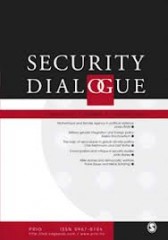Editors’ Introduction to a Special Section on the Report of the UN High-Level Panel, (with Robert Piper), Security Dialogue 36(3): 361-363.
Download
Topic: UN
» Notes on European political culture
28
Mar
2011
The International Community recreates itself
The International Community’s role in the crisis in Libya changed dramatically when NATO Secretary General Anders Fogh Rasmussen announced on Saturday that NATO Allies ‘have decided to take on the whole military operation in Libya under the United Nations Security Council Resolution’ (see announcement here). The step, he continued, ‘proves NATO’s capability to take decisive action’. Fogh Rasmussen explained that NATO had already in the previous week put together ‘a complete package of operations in support of the United Nations Resolution by sea and air’. The Secretary General in effect suggested that NATO would take over leadership in principle that de facto is exercising.
Security Council Resolution 1973 was in many regards momentous and without precedent. It builds on principles developed but never fully implement in the doctrine of Responsibility to Protect. Born in the 2001 report of an intergovernmental commission, it central provisions have survived in the fine print of a number of UN resolutions and documents. The doctrine essentially asserts that states have a responsibility to protect their populations from genocide, war crimes, ethnic cleansing, etc. and that where they fail to take action on this responsibility, or are themselves the actual cause of these sufferings, then the responsibility falls to the International Community. Though the resolution does not mention the doctrine, it specifically evokes its language.
The immense challenge that immediately unfolded was a practical one. Who is to implement? Who will apply the no fly zone called for in the Resolution? Who will protect the citizens as required in the Resolution? In the Resolution it is ‘Member States’, ‘acting national or through regional organization or arrangements’ to ‘to take all necessary measures to protect civilians under threat of attack in the country who are under threat or attack’. The Resolution ‘authorizes’, but does not require Member States to act, nor does it specify which Member States should implement.
Arguably this ambiguity plays an important role in making political action possible. Without it, many potential participants in an international action would remain reluctant. The International Community is self-organizing. That is its virtue and its bane. In its response to the Resolution it is a certain International Community, not necessarily the International Community that rises to the challenge. Which one? [ More… ]
30
Oct
2010
Rapid reactions in Greece
European history was made on Thursday as the EU Rapid Border Intervention Team (RABIT) was deployed for the first time every in its history. The team, one of several operated by Frontex, the European Border Management Agency, created in 2007, was deployed on the request of the Greek government in order to help to stop the increasingly high numbers of irregular immigrants crossing into Greece–and the EU–from Turkey. (Reports by EU Observer and European Voice). As Frontex Exective Director said, ‘Frontex stands ready to assist Greece by activating the RABIT mechanism in this urgent and exceptional situation’ (Frontex announcement).
The move seems in part provoked by the release of a UN report only a few days before describing the conditions of undocumented detainees in Greece as ‘catastrophic’ and documenting episodes of torture and ill-treatment by police.
According to Frontex, more than three-quarters of the 40,977 people intercepted while trying to enter into without proper documents into the EU in the first half of 2010 entered across the Greece-Turkey border. [ More… ]










